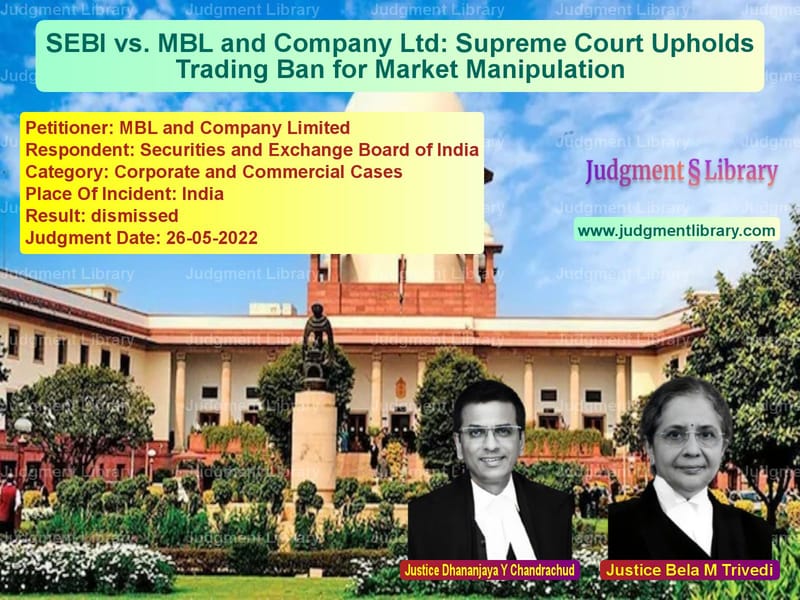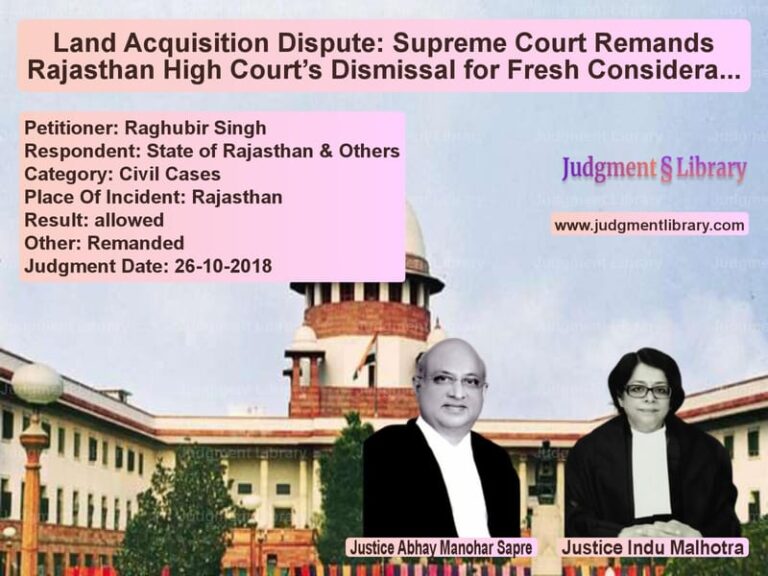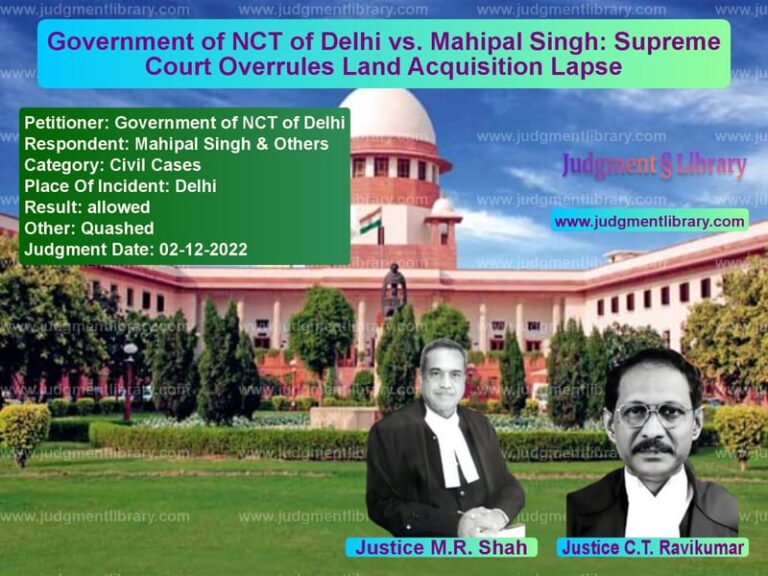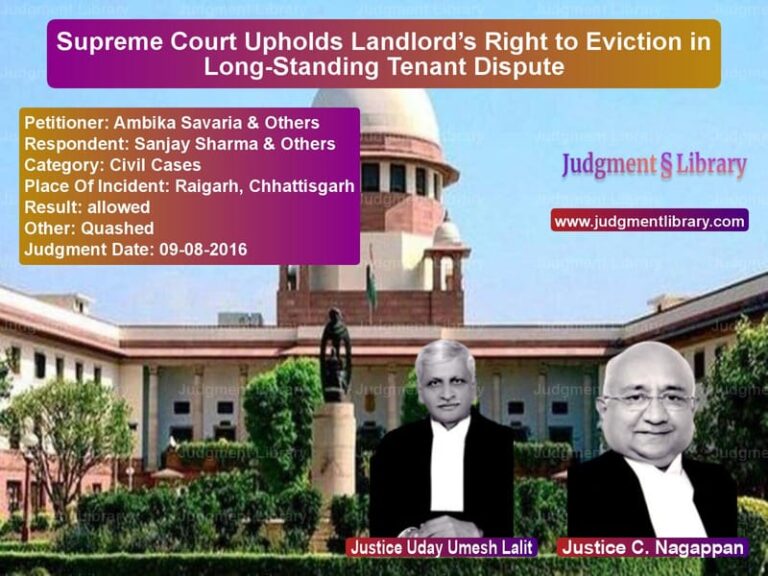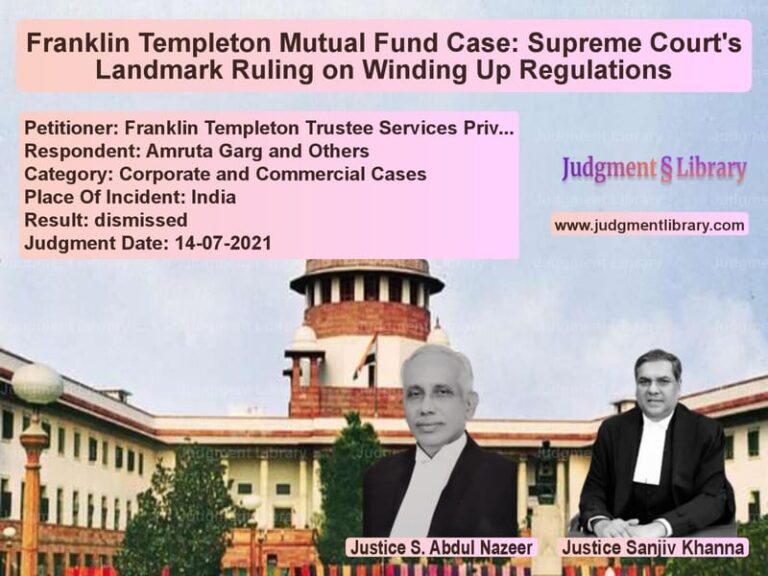SEBI vs. MBL and Company Ltd: Supreme Court Upholds Trading Ban for Market Manipulation
The case of MBL and Company Ltd. vs. Securities and Exchange Board of India (SEBI) centered around allegations of market manipulation through self-trades, leading to regulatory actions by SEBI. The Supreme Court examined whether the penalties imposed, including a four-year trading ban, were justified in light of the violations.
Background of the Case
The Securities and Exchange Board of India (SEBI) took action against MBL and Company Ltd. after an investigation revealed that the company had engaged in self-trades to artificially manipulate the stock price of Gujarat NRE Coke Limited (GNCL). The investigation found that out of 5,041 self-trades executed between December 15, 2011, and February 24, 2012, a significant number were executed through the same terminal ID.
As a result, SEBI’s Whole Time Member (WTM) passed an order on February 28, 2020, restraining MBL from buying, selling, or dealing in securities in its proprietary account for four years. Additionally, an adjudicating officer imposed a penalty of Rs. 15 lakhs on March 17, 2020.
The Securities Appellate Tribunal (SAT) upheld SEBI’s findings on May 13, 2022, leading MBL to challenge the decision in the Supreme Court.
Key Legal Issues
- Whether SEBI’s findings that MBL engaged in manipulative self-trading were justified.
- Whether the four-year trading ban imposed by SEBI was excessive and disproportionate.
- Whether the penalties violated the principle of proportionality in regulatory enforcement.
Arguments Presented
Appellant’s Arguments (MBL and Company Ltd.)
- MBL argued that the total gain from the alleged manipulation was only Rs. 2.61 lakhs, which was insignificant compared to the overall market size.
- The trades in question represented only 0.04% of the total market volume, making the impact negligible.
- The four-year trading ban was disproportionate and would severely affect the company’s 450 employees.
- SEBI had already imposed a monetary penalty of Rs. 15 lakhs, so imposing a trading ban was excessive.
Respondent’s Arguments (SEBI)
- SEBI argued that market manipulation is not just about financial gain; it affects the integrity of the securities market.
- The investigation found that MBL manipulated prices by placing single-share self-trades to create a misleading price trend.
- The self-trades had a significant impact on the last traded price (LTP), contributing to a positive LTP of Rs. 289.35, representing 12.64% of total market LTP.
- The penalty and trading ban were necessary to protect investor confidence and prevent future manipulation.
Supreme Court’s Observations
The Supreme Court upheld SEBI’s decision, making the following key observations:
- Market integrity is paramount: The Court emphasized that securities market manipulation must be dealt with strictly, regardless of the financial gain involved.
- Intentional manipulation was evident: The trading pattern showed that MBL used self-trades to artificially inflate the stock price, misleading other investors.
- Volume of trading does not justify manipulation: Even if the manipulated volume was small, the act itself undermines investor confidence and market fairness.
- Proportionality of penalty: The Supreme Court ruled that SEBI’s actions were not disproportionate, citing the need to maintain market discipline.
Key Excerpts from the Judgment
The Supreme Court noted:
“The securities market deals with the wealth of investors. Any such manipulation is liable to cause serious detriment to investors’ wealth.”
Further, the Court stated:
“Market abuse impairs economic growth and erodes investor confidence. Prevention of market abuse and preservation of market integrity is the hallmark of securities law.”
Final Verdict
The Supreme Court dismissed MBL’s appeal and upheld SEBI’s actions, ruling that:
- The four-year trading ban was justified given the manipulative intent.
- MBL violated SEBI’s regulations on market manipulation and unfair trade practices.
- The penalties imposed were proportional to the nature of the offense.
Outcome: The Supreme Court reinforced SEBI’s authority in regulating securities markets and maintaining investor trust, emphasizing that manipulative practices will be met with strict penalties.
Petitioner Name: MBL and Company Limited.Respondent Name: Securities and Exchange Board of India.Judgment By: Justice Dhananjaya Y Chandrachud, Justice Bela M Trivedi.Place Of Incident: India.Judgment Date: 26-05-2022.
Don’t miss out on the full details! Download the complete judgment in PDF format below and gain valuable insights instantly!
Download Judgment: mbl-and-company-limi-vs-securities-and-excha-supreme-court-of-india-judgment-dated-26-05-2022.pdf
Directly Download Judgment: Directly download this Judgment
See all petitions in Corporate Compliance
See all petitions in unfair trade practices
See all petitions in Judgment by Dhananjaya Y Chandrachud
See all petitions in Judgment by Bela M. Trivedi
See all petitions in dismissed
See all petitions in supreme court of India judgments May 2022
See all petitions in 2022 judgments
See all posts in Corporate and Commercial Cases Category
See all allowed petitions in Corporate and Commercial Cases Category
See all Dismissed petitions in Corporate and Commercial Cases Category
See all partially allowed petitions in Corporate and Commercial Cases Category

